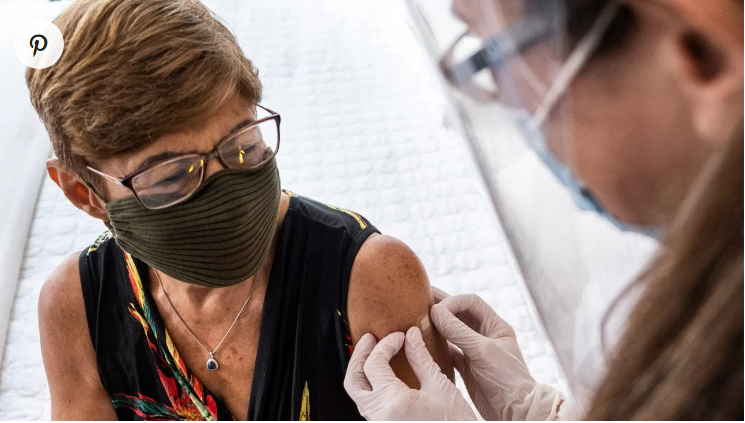- Experts continue to say blood clots caused by COVID-19 vaccines are a rare occurrence.
- So far, the clots have appeared in about 5 people for every 1 million vaccinated. The rate among people diagnosed with COVID-19 is 39 per million.
- A government panel is scheduled to announce on April 23 a decision on whether to lift the pause on the Johnson & Johnson vaccine.
The parents of an 18-year-old Nevada woman say she is slowly improving after experiencing seizures this month.
Her family says the teen, Emma Burkey, has had three brain surgeries related to blood clots. She began feeling sick about a week after receiving the one-dose Johnson & Johnson COVID-19 vaccine.
Burkey is among the youngest of the six women the Centers for Disease Control and Prevention (CDC) cited as it pausedTrusted Source the vaccine last week.
Of the 7.5 million doses given, the agency says the half dozen women, ages 18 to 48, developed a rare type of blood clot. The rare clots can appear in the brain or abdomen, along with a low blood platelet level that affects clotting.
At the White House COVID-19 Response Team’s briefing on April 19, CDC Director Rochelle Wallensky said scientists are investigating a few other cases to see whether they’re related.
Meanwhile, the pause on the Johnson & Johnson vaccine is going into its second week. Some experts worry an extended pause could erode the public’s faith in the vaccine.
Dr. William Schaffner, an infectious disease expert at Vanderbilt University in Nashville, and a consultant and non-voting member of the CDC’s Advisory Committee on Immunization Practices (ACIP), says the pause is proof the system is working.
“Here in the United States, we have the world’s best vaccine safety surveillance system,” he told Healthline. “It picked out a needle in a haystack, this very unusual phenomenon… occurred once for every 1 million doses distributed.
“These cases were quickly identified, analyzed, and there was an emergent meeting of the ACIP. The committee put on the pause while they are gathering more data,” Schaffner added. “There’s no drug or vaccine that is without the occasional rare side effect.”
A rare occurrence
Rare blood clots have also been documented in people who have received the AstraZeneca vaccine.
A University of Oxford study reported that the clots occurred in about 5 in 1 million people after their first dose.
The vaccine uses a viral vector technique similar to that of the Johnson & Johnson vaccine, but it is not approved for use in the United States.
The Oxford study also found that having COVID-19 puts you at risk for the rare clots. In the more than 500,000 study participants diagnosed with COVID-19, the clots occurred at the rate of 39 in 1 million.
Where else do they show up?
“Depending on which epidemiologic studies you look at, 2 to 5 people out of a million will have a cerebral sinus thrombosis,” said Dr. Jean M. Connors, an associate professor of medicine in the Hematology Division at Brigham and Women’s Hospital in Massachusetts.
“I see them in young women who’ve been on oral contraceptives, people who have lumbar punctures, people who are critically ill with infections,” she told Healthline.
The CDC says there haven’t been any reports of the clots among the 180 million doses of the Pfizer and Moderna vaccines that had been administered in the United States as of April 13.
In difficult times, you need to be able to turn to experts who understand and can help strengthen your mental well-being. We’re here for you.
What’s the cause?
The New England Journal of Medicine published a letter last week from Johnson & Johnson in which the company said there wasn’t enough evidence to tie its vaccine to the rare blood-clotting condition.
The letter said one case occurred during its clinical trial with more than 75,000 participants. The company says it paused the trial to investigate and found that the one participant had antibodies against a platelet factor.
Meanwhile, federal health officials are gathering data to look for the cause of the rare clots associated with the vaccine.
“”I have to say it’s highly suspicious that it’s occurring with these two vaccines in the same time frame with the same clinical findings,” Connors said. “So, there is some cause and effect, but we don’t know what.”
“This is not a coincidence… since Moderna and Pfizer are not involved with this but AstraZeneca and Johnson & Johnson are,” Schaffner said. “The AstraZeneca and Johnson & Johnson vaccines are made differently than the mRNA vaccines by Pfizer and Moderna are.”
What’s next?
The ACIP will meet again on April 23 and is expected to make a recommendation. The public can tune in to the debate.
Johnson & Johnson said in a press release it would resume its vaccine rollout in Europe. The drug regulator for the European Union recommended that its vaccine carry a warning about a possible link to rare blood clots but that the benefits of the vaccine outweighed the risks.
It could be a preview of what’s to come in the United States.
Source: https://www.healthline.com/health-news/everything-you-need-to-know-about-covid-19-vaccines-and-blood-clots#Whats-next?






